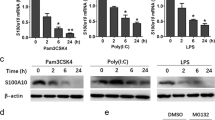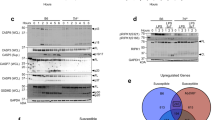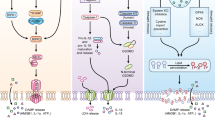Abstract
Macrophages are pivotal constituents of the innate immune system, vital for recognition and elimination of microbial pathogens1. Macrophages use Toll-like receptors (TLRs) to detect pathogen-associated molecular patterns—including bacterial cell wall components, such as lipopolysaccharide or lipoteichoic acid, and viral nucleic acids, such as double-stranded (ds)RNA—and in turn activate effector functions, including anti-apoptotic signalling pathways2. Certain pathogens, however, such as Salmonella spp., Shigellae spp. and Yersiniae spp., use specialized virulence factors to overcome these protective responses and induce macrophage apoptosis3. We found that the anthrax bacterium, Bacillus anthracis, selectively induces apoptosis of activated macrophages4 through its lethal toxin, which prevents activation of the anti-apoptotic p38 mitogen-activated protein kinase4. We now demonstrate that macrophage apoptosis by three different bacterial pathogens depends on activation of TLR4. Dissection of anti- and pro-apoptotic signalling events triggered by TLR4 identified the dsRNA responsive protein kinase PKR as a critical mediator of pathogen-induced macrophage apoptosis. The pro-apoptotic actions of PKR are mediated both through inhibition of protein synthesis and activation of interferon response factor 3.
This is a preview of subscription content, access via your institution
Access options
Subscribe to this journal
Receive 51 print issues and online access
$199.00 per year
only $3.90 per issue
Buy this article
- Purchase on Springer Link
- Instant access to full article PDF
Prices may be subject to local taxes which are calculated during checkout





Similar content being viewed by others
References
Aderem, A. & Ulevitch, R. J. Toll-like receptors in the induction of the innate immune response. Nature 406, 782–787 (2000)
Medzhitov, R. Toll-like receptors and innate immunity. Nature Rev. Immunol. 1, 135–145 (2001)
Weinrauch, Y. & Zychlinsky, A. The induction of apoptosis by bacterial pathogens. Annu. Rev. Microbiol. 53, 155–187 (1999)
Park, J. M., Greten, F. R., Li, Z. W. & Karin, M. Macrophage apoptosis by anthrax lethal factor through p38 MAP kinase inhibition. Science 297, 2048–2051 (2002)
Poltorak, A. et al. Defective LPS signaling in C3H/HeJ and C57BL/10ScCr mice: mutations in Tlr4 gene. Science 282, 2085–2088 (1998)
Medzhitov, R., Preston-Hurlburt, P. & Janeway, C. A. Jr A human homologue of the Drosophila Toll protein signals activation of adaptive immunity. Nature 388, 394–397 (1997)
Hoebe, K. et al. Identification of Lps2 as a key transducer of MyD88-independent TIR signalling. Nature 424, 743–748 (2003)
Yamamoto, M. et al. TRAM is specifically involved in the Toll-like receptor 4-mediated MyD88-independent signaling pathway. Nature Immunol. 4, 1144–1150 (2003)
Kawai, T., Adachi, O., Ogawa, T., Takeda, K. & Akira, S. Unresponsiveness of MyD88-deficient mice to endotoxin. Immunity 11, 115–122 (1999)
Naito, A. et al. Severe osteopetrosis, defective interleukin-1 signalling and lymph node organogenesis in TRAF6-deficient mice. Genes Cells 4, 353–362 (1999)
Karin, M. & Lin, A. NF-κB at the crossroads of life and death. Nature Immunol. 3, 221–227 (2002)
Li, Z. W., Omori, S. A., Labuda, T., Karin, M. & Rickert, R. C. Ikkβ is required for peripheral B cell survival and proliferation. J. Immunol. 170, 4630–4637 (2003)
Kuhn, R., Schwenk, F., Aguet, M. & Rajewsky, K. Inducible gene targeting in mice. Science 269, 1427–1429 (1995)
Horng, T., Barton, G. M. & Medzhitov, R. TIRAP: an adapter molecule in the Toll signaling pathway. Nature Immunol. 2, 835–841 (2001)
Kaufman, R. J. Double-stranded RNA-activated protein kinase mediated virus-induced apoptosis: a new role for an old actor. Proc. Natl Acad. Sci. USA 96, 116935 (1999)
Chu, W. M. et al. JNK2 and IKKβ are required for activating the innate response to viral infection. Immunity 11, 721–731 (1999)
Samuel, C. E. Antiviral actions of interferons. Clin. Microbiol. Rev. 14, 778–809 (2001)
Lehner, M., Felzmann, T., Clodi, K. & Holter, W. Type I interferons in combination with bacterial stimuli induce apoptosis of monocyte-derived dendritic cells. Blood 98, 736–742 (2001)
Muller, U. et al. Functional role of type I and type II interferons in antiviral defense. Science 264, 1918–1921 (1994)
Saelens, X., Kalai, M. & Vandenabeele, P. Translation inhibition in apoptosis: caspase-dependent PKR activation and eIF2-alpha phosphorylation. J. Biol. Chem. 276, 41620–41628 (2001)
Diebold, S. S. et al. Viral infection switches non-plasmacytoid dendritic cells into high interferon producers. Nature 424, 324–328 (2003)
Scheuner, D. et al. Translational control is required for the unfolded protein response and in vivo glucose homeostasis. Mol. Cell 7, 1165–1176 (2001)
Heylbroeck, C. et al. The IRF-3 transcription factor mediates Sendai virus-induced apoptosis. J. Virol. 74, 3781–3792 (2000)
Sato, M. et al. Distinct and essential roles of transcription factors IRF-3 and IRF-7 in response to viruses for IFN-α/β gene induction. Immunity 13, 539–548 (2000)
Orth, K. et al. Disruption of signaling by Yersinia effector YopJ, a ubiquitin-like protein protease. Science 290, 1594–1597 (2000)
Rosenberger, C. M. & Finlay, B. B. Phagocyte sabotage: disruption of macrophage signalling by bacterial pathogens. Nature Rev. Mol. Cell Biol. 4, 385–396 (2003)
Durbin, R. K., Mertz, S. E., Koromilas, A. E. & Durbin, J. E. PKR protection against intranasal vesicular stomatitis virus infection is mouse strain dependent. Viral Immunol. 15, 41–51 (2002)
Yang, Y. L. et al. Deficient signaling in mice devoid of double-stranded RNA-dependent protein kinase. EMBO J. 14, 6095–6106 (1995)
Browne, S. H., Lesnick, M. L. & Guiney, D. G. Genetic requirements for salmonella-induced cytopathology in human monocyte-derived macrophages. Infect. Immun. 70, 7126–7135 (2002)
Zhang, Y. & Bliska, J. B. Role of Toll-like receptor signaling in the apoptotic response of macrophages to Yersinia infection. Infect. Immun. 71, 1513–1519 (2003)
Acknowledgements
We thank E. Raz, V. Redecke, S. Akira, J. Inoue, T. Taniguchi and B. Beutler for various knockout mice and bone marrow, J. Bliska for Yersiniae strains, N. Sonenberg and R. Medzhitov for gifts of plasmids and antibodies, and M. Delhase for technical assistance. L.-C.H., J.M.P., J.-L.L. and S.M. were supported by postdoctoral fellowships from the Cancer Research Institute, the Irvington Institute, the International Union Against Cancer and the Japanese Society for Promotion of Science, respectively. Work in the laboratories of M.K., D.G.G. and L.E. was supported by grants from the National Institutes of Health. M.K. is an American Cancer Society Research Professor.
Author information
Authors and Affiliations
Corresponding author
Ethics declarations
Competing interests
The authors declare that they have no competing financial interests.
Supplementary information
Rights and permissions
About this article
Cite this article
Hsu, LC., Mo Park, J., Zhang, K. et al. The protein kinase PKR is required for macrophage apoptosis after activation of Toll-like receptor 4. Nature 428, 341–345 (2004). https://doi.org/10.1038/nature02405
Received:
Accepted:
Issue Date:
DOI: https://doi.org/10.1038/nature02405
This article is cited by
-
Carvacrol attenuated lipopolysaccharide-induced intestinal injury by down-regulating TLRs gene expression and regulating the gut microbiota in rabbit
Scientific Reports (2023)
-
The critical role of apoptosis in mesenchymal stromal cell therapeutics and implications in homeostasis and normal tissue repair
Cellular & Molecular Immunology (2023)
-
Identification of novel alternative splicing associated with mastitis disease in Holstein dairy cows using large gap read mapping
BMC Genomics (2022)
-
PKR and TLR3 trigger distinct signals that coordinate the induction of antiviral apoptosis
Cell Death & Disease (2022)
-
Deletion of IKK2 in haematopoietic cells of adult mice leads to elevated interleukin-6, neutrophilia and fatal gastrointestinal inflammation
Cell Death & Disease (2021)
Comments
By submitting a comment you agree to abide by our Terms and Community Guidelines. If you find something abusive or that does not comply with our terms or guidelines please flag it as inappropriate.



